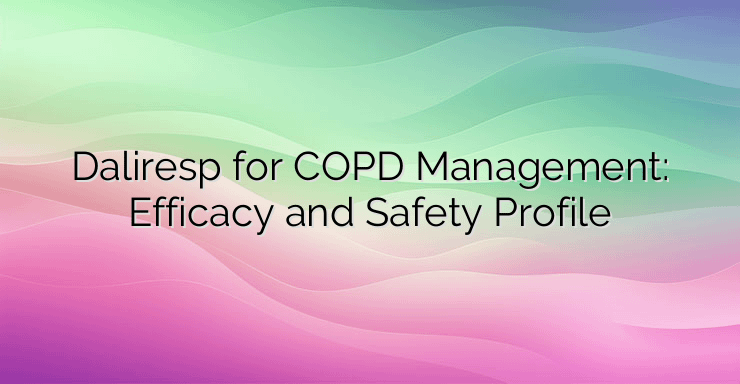Chronic obstructive pulmonary disease (COPD) is a progressive lung disease that affects millions worldwide. Daliresp, also known as roflumilast, is a medication often prescribed for COPD management. Here, we delve into the efficacy and safety profile of Daliresp, addressing common questions and concerns surrounding its use.
What is Daliresp and How Does it Work?
Daliresp is a phosphodiesterase 4 (PDE4) inhibitor, a type of medication that works by reducing inflammation in the lungs. It helps to decrease the frequency of exacerbations and improve lung function in patients with severe COPD.
Is Daliresp Effective in Managing COPD Symptoms?
Clinical studies have shown that Daliresp can reduce the risk of COPD exacerbations and improve lung function. It is particularly beneficial for patients with severe COPD who are at a higher risk of exacerbations.
What are the Common Side Effects of Daliresp?
Like any medication, Daliresp may cause side effects. Common side effects include diarrhea, nausea, headache, and weight loss. These side effects are usually mild to moderate and may improve over time.
Who Should Consider Using Daliresp?
Daliresp is typically prescribed for patients with severe COPD who have frequent exacerbations despite using other COPD medications. It is not suitable for everyone, so it’s essential to consult with a healthcare professional to determine if Daliresp is the right choice for you.
How is Daliresp Taken?
Daliresp is taken orally, usually once daily. It comes in the form of a tablet and should be taken with food to reduce the risk of stomach upset. It’s essential to follow your healthcare provider’s instructions carefully when taking Daliresp.
Are There Any Precautions or Contraindications for Daliresp?
Before starting Daliresp, inform your healthcare provider about any other medications you are taking, especially other COPD medications or medications that may interact with Daliresp. Additionally, Daliresp is not recommended for use in patients with moderate to severe liver impairment.
What Should I Do If I Experience Severe Side Effects While Taking Daliresp?
If you experience severe side effects while taking Daliresp, such as severe diarrhea, persistent nausea, or unexplained weight loss, contact your healthcare provider immediately. They can provide guidance on whether to continue taking the medication or adjust the dosage.
Can Daliresp Interact with Other Medications?
Yes, Daliresp can interact with other medications, including certain antibiotics, antifungal medications, and antidepressants. It’s essential to inform your healthcare provider about all medications you are taking to avoid potential interactions.
How Long Does it Take to See Results with Daliresp?
The effects of Daliresp may not be immediately noticeable. It may take several weeks of consistent use to experience the full benefits of the medication. It’s essential to continue taking Daliresp as prescribed, even if you don’t notice immediate improvements in symptoms.
What Should I Do If I Miss a Dose of Daliresp?
If you miss a dose of Daliresp, take it as soon as you remember. However, if it’s almost time for your next dose, skip the missed dose and take your next dose at the regular time. Do not double up on doses to make up for a missed dose.
Understanding Daliresp Dosage and Administration
Daliresp is available in tablet form, with each tablet containing 500 mcg of roflumilast. The recommended dosage is one tablet (500 mcg) taken orally once daily with food.
When initiating Daliresp treatment, it’s essential to start with a low dose and gradually increase to the recommended dosage to minimize the risk of side effects.
Daliresp FAQ
1. Can Daliresp be used as a rescue medication for sudden COPD symptoms?
No, Daliresp is not a rescue medication. It is a maintenance medication intended for long-term management of COPD symptoms.
2. Are there any dietary restrictions while taking Daliresp?
There are no specific dietary restrictions while taking Daliresp. However, taking it with food may help reduce the risk of stomach upset.
3. Can Daliresp be used in patients with asthma?
No, Daliresp is not indicated for the treatment of asthma. It is specifically approved for the management of COPD.
4. Is Daliresp safe for use in elderly patients?
Daliresp can be used in elderly patients with COPD; however, caution should be exercised, especially in patients with comorbidities or taking multiple medications.
5. How long should I continue taking Daliresp?
It’s essential to continue taking Daliresp as prescribed by your healthcare provider, even if you feel better. Stopping the medication abruptly can increase the risk of COPD exacerbations.
6. Can Daliresp cause allergic reactions?
While rare, allergic reactions to Daliresp can occur. Seek medical attention immediately if you experience symptoms such as rash, itching, swelling, or difficulty breathing after taking Daliresp.
7. Can Daliresp be crushed or split?
No, Daliresp tablets should be swallowed whole and not crushed or split. This helps ensure the proper dosage is delivered and prevents potential irritation of the mouth or throat.
This comprehensive guide provides valuable insights into Daliresp for COPD management, covering its efficacy, safety profile, dosage, administration, and commonly asked questions. If you have any concerns or questions about Daliresp, consult your healthcare provider for personalized guidance.


Leave a Reply